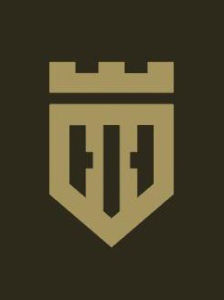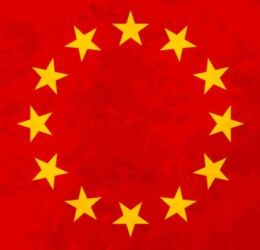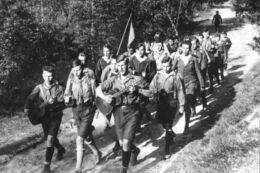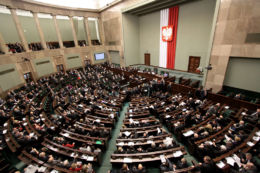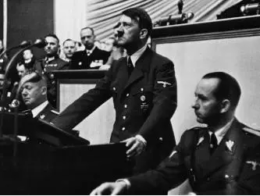Angelo Plume (Telegram, YouTube) did a solo news roundup on the latest broadcast of Counter-Currents Radio, discussing the recent French elections as well as other current things, and of course answered listener questions. It is now available for download and online listening. (more…)
Tag: Poland
-
June 18, 2024 Jarosław Ostrogniew
Voting in the Shadow of Death
The 2024 European Parliamentary Elections in Poland
Mateusz Sitek, the 21-year-old Polish soldier who died from injuries he sustained after being stabbed by a migrant while defending the Polish border.
1,848 words
The European Parliament elections in Poland in 2024 were considered by all the main players and commentators as a follow-up to the Polish parliamentary elections of 2023 — so I encourage all readers to read my report on it, as well as my essay on the new liberal government in Poland.
Polish politicians, analysts, and voters have always considered the European Parliament elections as secondary to the national parliamentary elections. (more…)
-
The following is reprinted from the Homeland Institute (website, Telegram).
Of white Americans aged 18 to 35, 87.3% of Democrats, 85.1% of Independents, and 72.2% of Republicans plan on below-replacement reproduction, meaning two or fewer children.
33.2% of all respondents, 35.9% of Democrats, 38.5% of Independents, and 23.1% of Republicans said that the financial cost of raising children overall was a barrier to having children. (more…)
-
Ryszard Gromadzki interviewed Prof. Andrzej Nowak, a historian at the Institute of History of the Polish Academy of Sciences in Warsaw and at the Jagiellonian University in Krakow, where he is the head of the Section for the History of Eastern Europe. (more…)
-
924 words
Poland joined the European Union 20 years ago. For many, it was the only right and natural choice. The EU was supposed to give us all that we had been denied by the Communist system. EU membership was to guarantee freedom of speech and opinion as well as freedom to conduct business, while ensuring the protection of private property. At the same time, the balance of power between the larger and smaller EU member states made us believe we would preserve our national sovereignty. (more…)
-
Most people, including nationalists, focus on schools and, to a lesser extent, universities when discussing education. Both of these are classic examples of formal education. In this essay I will argue that while formal education is important, it is not so much so as most people believe, and that non-formal and informal education are much more important. (more…)
-
January 2, 2024 Robert Hampton
Je Rusko vzorovým příkladem křesťanského nacionalismu?
1.277 slov
English original here
Mnozí lidé v našich kruzích jsou podle všeho přesvědčeni, že tou správnou cestou pro naše hnutí má být křesťanský nacionalismus. Obvykle ukazují na Maďarsko, Polsko a Rusko jako na doklad toho, že zaštítit naši věci křížem křesťanské identity je tou nejzaručenější cestou k srdcím mas a obnově bělošské civilizace v její právoplatné velkoleposti. (more…)
-
The most probable scenario came to pass in the aftermath of the 2023 Polish parliamentary elections (see my report on it here). To sum up events: The conservative Prawo i Sprawiedliwość (Law & Justice, or PiS) party, which had been in power for the two terms, won the most votes, but not enough to gain the total majority of seats in the Parliament. (more…)
-
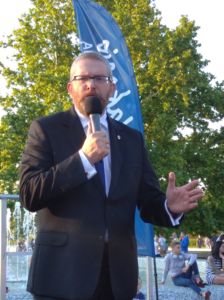
Grzegorz Braun. Photo courtesy of Wikimedia Commons

Grzegorz Braun. Photo courtesy of Wikimedia Commons
1,552 words
Now there is a Pole memed round the world . . . On the December 12, 2023, Polish MP Grzegorz Braun used a fire extinguisher to put out the lights on a hanukkiah (incorrectly referred to as a menorah in most reports) in the Polish Parliament. The questions everyone on the dissident Right is asking are how did that happen, and is Grzegorz Braun our guy? Just to spoil the fun for everyone right away: no, he is not our guy, and his intentions were not 100% “red-pilled.” Probably the best comparison we can make to anglosphere politics is to say that Braun is a “Catholic Alex Jones” of sorts. (more…)
-
2,746 words
Part 5 of 5 (Part 1 here, Part 4 here)
A German war with Poland was now a certainty, but a new continental war involving Britain and France was not. The most important obstacle to the widening of the conflict was that Britain quietly viewed French participation as an indispensable precondition of her own involvement, and the French had not committed themselves to action against Poland. (more…)
-
1,907 words
Part 4 of 5 (Part 1 here, Part 3 here, Part 5 here)
Hitler’s cancellation of military operations for August 26 left him with only five days before September 1, after which, according to his generals, a military campaign in Poland would no longer be feasible. If war was to be prevented, it had to be done within this time. (more…)
-
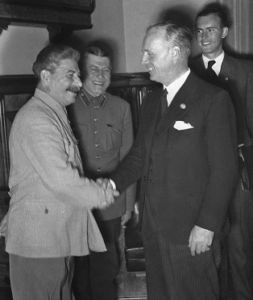
Joseph Stalin and Joachim von Ribbentrop during the signing of the German-Soviet Non-Aggression Pact on August 23, 1939.
1,852 words
Part 3 of 5 (Part 1 here, Part 2 here, Part 4 here)
By August 1939, everyone understood that a war between Germany and Poland was extremely probable. The great question was whether it might still be prevented from developing into a general European war. Hitler was under an important time constraint: since October rains transform Poland into a sea of mud, German military leaders warned him it would be unsafe to postpone the launch of hostilities past September 1. (more…)
-
4,041 words
Part 2 of 5 (Part 1 here, Part 3 here)
Given that both the United States and the Soviet Union were far larger and more powerful than Germany, and that the British themselves were still presiding over an enormous empire, one may wonder why Britain’s leadership was in such agreement on the supposedly urgent need to resist a far smaller power’s efforts to consolidate more of the German-speaking population of Central Europe within her borders. (more…)

